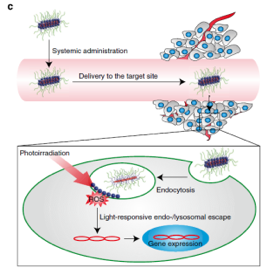Home > Press > Light-induced nanocarriers switch on improved gene therapy
 |
| A newly developed, light-induced nanocarrier for targeted gene therapy has been trialled by researchers in Japan. The three-layered micelle safely and effectively delivered gene packages in mice cancer tumor models. |
Abstract:
Nanocarriers are a useful means of transporting molecules such as genes to specific points in the body, for example to target tumors in cancer therapy. Such nanocarriers must be carefully controlled to avoid the random dissemination of genes in other organs en route to the target cells.
Light-induced nanocarriers switch on improved gene therapy
Kawasaki City, Japan | Posted on August 5th, 2014Using light as a ‘switch' to stimulate a nanocarrier into releasing a gene package exactly where it is needed is a potentially safe and effective way of controlling delivery in the body. Now, Nobuhiro Nishiyama at Tokyo Institute of Technology, and Kazunori Kataoka and co-workers at the University of Tokyo, together with scientists across Japan, have designed and built a nanocarrier capable of light-mediated gene delivery into a solid cancerous tumor.
One challenge the researchers faced was the need to compartmentalize the components of the nanocarrier. Photosensitive materials such as dendrimeric photosensitizer (DPc) can trigger photochemical damage to the gene package if they come into direct contact with the plasmid DNA (pDNA) core, rendering it inactive.
The new nanocarrier created by Kataoka and his team is made from a layered polyplex micelle - a self-assembling structure with three distinct layers. The micelle comprises a pDNA core, followed by an intermediary layer of DPc, and finally an outer hydrophilic layer of poly(ethylene glycol), which forms a shield to protect the package during passage through the body.
The micelle structure performed well in in vivo trials on mice tumor models. The researchers used photoirradiation to ‘flick the switch' once the micelle was safely inside a tumor cell, causing a DPc-mediated chemical reaction to break the membrane seal and release the DNA into the tumor cell nucleus. Successful gene expression followed, and the team believe their new light-induced nanocarrier system could be extended to deliver therapeutic agents for all manner of diseases in future.
Publication and Affiliation
Takahiro Nomoto1, Shigeto Fukushima2, Michiaki Kumagai2, Kaori Machitani2, Arnida2, Yu Matsumoto3, Makoto Oba4, Kanjiro Miyata3, Kensuke Osada1,5, Nobuhiro Nishiyama6 & Kazunori Kataoka1,2,3. Three-layered polyplex micelle as a multifunctional nanocarrier platform for light-induced systemic gene transfer. Nature Communications 5, 3545 (2014)
1. Department of Bioengineering, Graduate School of Engineering, The University of Tokyo, 7-3-1 Hongo, Bunkyo-ku, Tokyo 113-8656, Japan.
2. Department of Materials Engineering, Graduate School of Engineering, The University of Tokyo, 7-3-1 Hongo, Bunkyo-ku, Tokyo 113-8656, Japan.
3. Center for Disease Biology and Integrative Medicine, Graduate School of Medicine, The University of Tokyo, 7-3-1 Hongo, Bunkyo-ku, Tokyo 113-0033, Japan.
4. Graduate School of Biomedical Sciences, Nagasaki University, 1-14 Bunkyo-machi, Nagasaki 852-8521, Japan.
5. Precursory Research for Embryonic Science and Technology (PRESTO), Japan Science and Technology Agency (JST), 4-1-8 Honcho, Kawaguchi, Saitama 332-0012, Japan.
6. Polymer Chemistry Division, Chemical Resources Laboratory, Tokyo Institute of Technology, R1-11, 4259 Nagatsuta, Midori-ku, Yokohama 226-8503, Japan.
####
For more information, please click here
Contacts:
corresponding author
email address:
Copyright © Kawasaki City
If you have a comment, please Contact us.Issuers of news releases, not 7th Wave, Inc. or Nanotechnology Now, are solely responsible for the accuracy of the content.
| Related News Press |
News and information
![]() Researchers develop molecular qubits that communicate at telecom frequencies October 3rd, 2025
Researchers develop molecular qubits that communicate at telecom frequencies October 3rd, 2025
![]() Next-generation quantum communication October 3rd, 2025
Next-generation quantum communication October 3rd, 2025
![]() "Nanoreactor" cage uses visible light for catalytic and ultra-selective cross-cycloadditions October 3rd, 2025
"Nanoreactor" cage uses visible light for catalytic and ultra-selective cross-cycloadditions October 3rd, 2025
Nanomedicine
![]() New molecular technology targets tumors and simultaneously silences two ‘undruggable’ cancer genes August 8th, 2025
New molecular technology targets tumors and simultaneously silences two ‘undruggable’ cancer genes August 8th, 2025
![]() New imaging approach transforms study of bacterial biofilms August 8th, 2025
New imaging approach transforms study of bacterial biofilms August 8th, 2025
![]() Cambridge chemists discover simple way to build bigger molecules – one carbon at a time June 6th, 2025
Cambridge chemists discover simple way to build bigger molecules – one carbon at a time June 6th, 2025
![]() Electrifying results shed light on graphene foam as a potential material for lab grown cartilage June 6th, 2025
Electrifying results shed light on graphene foam as a potential material for lab grown cartilage June 6th, 2025
Discoveries
![]() Researchers develop molecular qubits that communicate at telecom frequencies October 3rd, 2025
Researchers develop molecular qubits that communicate at telecom frequencies October 3rd, 2025
![]() Next-generation quantum communication October 3rd, 2025
Next-generation quantum communication October 3rd, 2025
![]() "Nanoreactor" cage uses visible light for catalytic and ultra-selective cross-cycloadditions October 3rd, 2025
"Nanoreactor" cage uses visible light for catalytic and ultra-selective cross-cycloadditions October 3rd, 2025
Announcements
![]() Rice membrane extracts lithium from brines with greater speed, less waste October 3rd, 2025
Rice membrane extracts lithium from brines with greater speed, less waste October 3rd, 2025
![]() Researchers develop molecular qubits that communicate at telecom frequencies October 3rd, 2025
Researchers develop molecular qubits that communicate at telecom frequencies October 3rd, 2025
![]() Next-generation quantum communication October 3rd, 2025
Next-generation quantum communication October 3rd, 2025
![]() "Nanoreactor" cage uses visible light for catalytic and ultra-selective cross-cycloadditions October 3rd, 2025
"Nanoreactor" cage uses visible light for catalytic and ultra-selective cross-cycloadditions October 3rd, 2025
|
|
||
|
|
||
| The latest news from around the world, FREE | ||
|
|
||
|
|
||
| Premium Products | ||
|
|
||
|
Only the news you want to read!
Learn More |
||
|
|
||
|
Full-service, expert consulting
Learn More |
||
|
|
||








